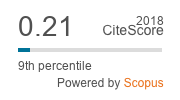Social Representation of Islam and Changes in the Stereotype of Muslims
Palabras clave:
Social representations, Stereotypes and stereotyping, Changes in stereotypes, RacismResumen
This study deals with discrimination against Muslims in France. Stereotyping phenomena of Muslims has been explored from both the structural approach of social representations and the stereotypes in social cognition. First-year psychology students (N= 123) took part in the experiment. In a first step, an association task to stimulus word "Islam" provided the social representations of Islam. In a second step, we tested experimentally if an objective piece of information on Islam change the stereotype of Muslims. It was only reduced for subjects who had some prior knowledge of Islam and whose representation of it was descriptive rather than evaluative. The psychosocial functions of representations and of stereotypes and stereotyping stability are discussed. We also mentioned that a dual-process hypothesis of liking persons or groups (Clement & Krueger, 1998) could enlighten researches on Muslims stereotypes. Finally, we mentioned the role of social practices in social representations and cognitions modifications (Rouquette, 1997; Abric, 1994; Flament, 1994)
Descargas
Citas
Presses Universitaires de France.
Allport, G.W. (1954). The nature of prejudice. Reading, Mass:
Addison Wesley.
Brewer, M.B., & Kramer, R.M. (1985). The psychology of intergroup
attitudes and behaviour. Annual Review of Psychology,
36, 219-243.
Brigham, J. (1971). Ethnic Stereotypes. Psychological Bulletin, 76,
15-38.
Clement R.W. & Krueger J. (1998). Liking persons versus liking
groups: A dual-process hypothesis. European Journal of Social
Psychology, 28, 457-469.
Corneille, O. & Leyens, J.P. (1994). Catégories, catégorisation sociale
et essentialisme psychologique. In R.Y. Bourhis & J.P.
Leyens (Eds.), Stéréotypes, discrimination et relations intergroupes
(pp. 41-68). Bruxelles: Mardaga.
Doise, W. (1990). Les représentations sociales. In R. Ghiglione, C.
Bonnet & J.F. Richard (Eds.). Traité de psychologie cognitive
(Volume 3, pp. 111-174). Paris: Dunod.
Fiske, ST. & Taylor, S.E. (1984). Social cognition. Reading, Mass:
Addison Wesley.
Flament С (1989). Structure et dynamique des représentations
sociales. In D. Jodelet (Ed.), Les représentations sociales (pp.
204-219). Paris: Presses Universitaires de France.
Flament C. (1994). Structure, dynamique et transformation des représentations
sociales. In J.C. Abric, J.C. (Ed.), Pratiques sociales
et représentations (pp. 37-57). Paris: Presses Universitaires
de France.
Gilbert, G.M. (1951). Stereotype persistence and change among
college students. Journal of Abnormal and Social Psychology,
46, 245-254.
Hamilton, D.L. (1979). A cognitive-attributional analysis of stereotyping.
In L. Berkowitz (Ed.), Advances in experimental
social psychology (Volume 12, pp. 53-84). New York: Academic
Press.
Kelly, G.A. (1955). A theory of personality. New York: Wiley.
Lemaine, G. (1999). Quelques remarques sur le domaine du racisme.
Psychologie Française, 44(2), 131-142.
Leyens, J.P. (1983). Sommes-nous tous des psychologues?Approche
psychosociale des théories implicites de personnalité. Bruxelles:
Mardaga.
Leyens, J.P., Yzerbyt, V. & Schadron, G. (1996). Stéréotypes et
cognition sociale. Bruxelles: Mardaga.
McConahay, J.B. (1983). Modern racism and modern discrimination:
The effects of race, racial attitudes, and context on simulated
hiring decision. Personality and Social Psychology Bulletin,
9, 551-558.
Meenes, M. (1943). A comparison of racial stereotypes of 1935
and 1942. Journal of Social Psychology, 17, 327-336.
Milgram, S. (1974). Soumission à Vautorité. Paris: Calman-Lévy.
Miller, A.G. (Ed.). (1982). In the eyes of the beholder: Contemporary
issues in Stereotyping. New York: Praeger.
Moscovici, S. (1984). The phenomenon of social representations.
In R. Farr & S. Moscovici (Eds.), Social Representations (pp.
3-69). Cambridge: Cambridge University Press.
Oakes, P.J. & Turner, J.C. (1990). Is limited information processing
capacity the cause of social stereotyping? In W. Stroebe &
M. Hewstone (Eds.), European Review of Social Psychology
(Volume l,pp. 111-135). John Wiley & Sons Ltd.C.
Pettigrew, T.F. (1989). The nature of modern racism in the United
States. Revue Internationale de Psychologie Sociale, 2, 291-
303.
Pettigrew T.F. & Meertens R.W. (1995). Subtle and blatant prejudice
in western Europe. European Journal of Social Psychology,
25, 57-75.
Reinert, M. (1978). Presentation d'un programme de classification.
Application à une analyse de contenu. These de III° Cycle,
Paris.
Reinert, M. (1983). Une méthode de classification descendante
hiérarchique: application à Г analyse lexicale par contexte. Les
Cahiers de I 'Analyse des Données, VIII(2), 187-193.
Rokeach, M. (Ed.). (1960). The open and closed mind. New York:
Basic Books.
Rouquette, M.L. (1997). La chasse à Timmigré. Violence, mémoire
et représentations. Bruxelles: Mardaga.
Snyder, C.R. & Fromkin, H.L. (1980). Uniqueness, the human
pursuit of difference. New York: Plenum Press.
Snyder, M. & Gangenstad, S. (1981). Hypothesis-testing processes.
In J.H. Harvey, W.J. Ickes & R.F. Kidd (Eds.), New Directions
in Attribution Research (Volume 3). Hillsdale, N.J.: Erlbaum.
Tajfel, H. (1969). The cognitive aspects of prejudice. Journal of
Social Issues, 25, 79-97.
Tajfel, H. (1968). Social and cultural factors in perception. In G.
Lindzey & E. Aronson (Eds.), Handbook of Social Psychology
(Volume 3, pp. 315-394, 2nd ed.). Reading, Mass: Addison-
Wesley.
Tajfel H. & Forgas, J.P. (1982). Social categorization: Cognitions,
values and groups. In J.P. Forgas (Ed.), Social Cognition perspective
on everyday understanding (pp. 113-135). London:
Academic Press.
Todd, E. (1994). Le destin des immigrés. Assimilation et ségrégation
dans les démocraties occidentales. Editions du Seuil.
Turner, J.C. & Giles, H. (Eds.). (1981). Intergroup Behaviour.
Oxford: Blackwell.



